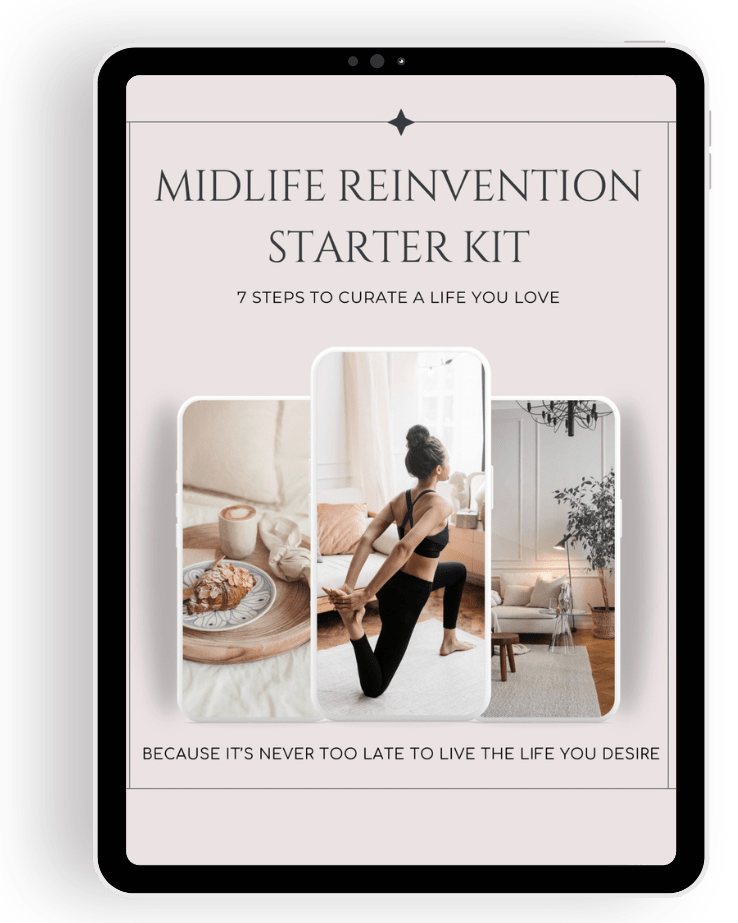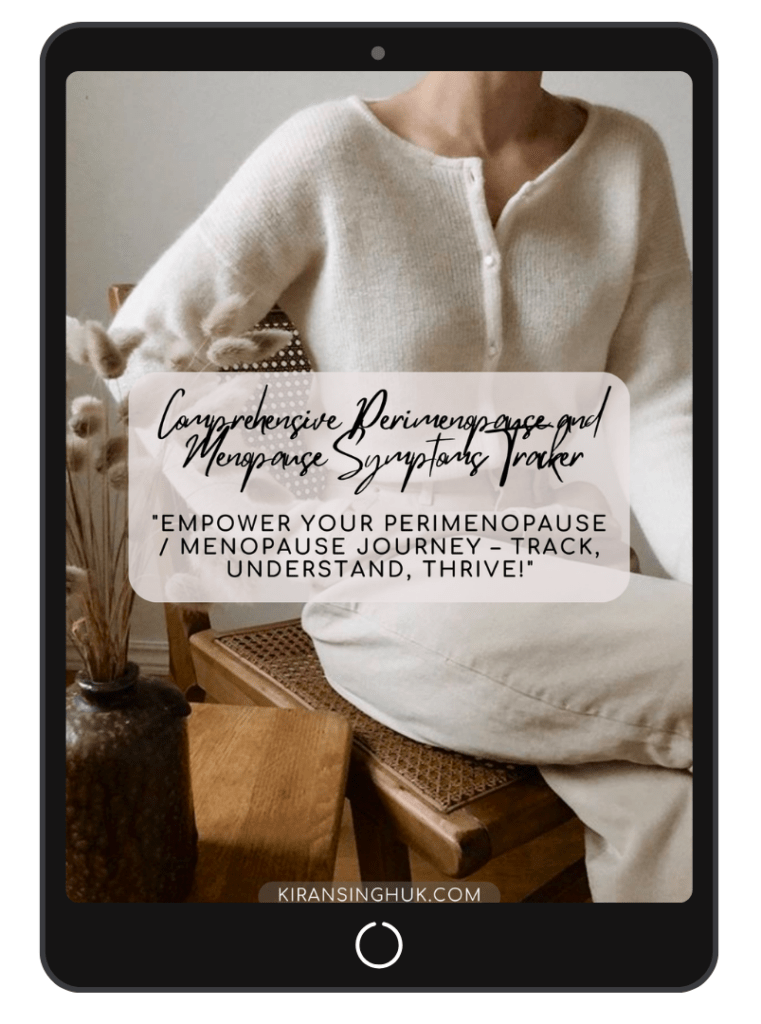Oestrogen is one of the most influential hormones in a woman’s body, playing a crucial role in reproductive health, metabolism, brain function, heart health, and bone strength. During perimenopause and menopause, oestrogen levels fluctuate and eventually decline, triggering a wide range of physical, emotional, and cognitive symptoms.
This guide explores how oestrogen affects the body, the impact of its decline during perimenopause and menopause, and evidence-based strategies to support hormone balance naturally.

1. What is Oestrogen and Why is it Important?
Oestrogen is a sex hormone primarily produced in the ovaries, with small amounts produced in fat cells and the adrenal glands. It exists in three main forms:
- Oestradiol (E2) – The most potent and dominant form in reproductive years.
- Oestrone (E1) – The main type of oestrogen after menopause.
- Oestriol (E3) – The weakest form, primarily present during pregnancy.
Key Functions of Oestrogen in the Body
- ✔ Regulates the menstrual cycle and ovulation
- ✔ Supports brain function – enhances memory, mood, and focus
- ✔ Maintains bone density – prevents osteoporosis
- ✔ Protects heart health – keeps blood vessels flexible
- ✔ Supports metabolism – regulates fat storage and insulin sensitivity
- ✔ Promotes skin and collagen production – prevents dryness and wrinkles
2. How Oestrogen Levels Change During Perimenopause & Menopause
Perimenopause: The Hormonal Rollercoaster (Ages 35–50)
- Oestrogen levels fluctuate unpredictably – sometimes surging, other times plummeting.
- Women experience irregular periods, mood swings, brain fog, and weight changes.
- Progesterone levels decline first, worsening the effects of erratic oestrogen.
Menopause: The Permanent Shift (Average Age 51+)
- Oestrogen drops to consistently low levels.
- Periods stop completely, and the reproductive function ends.
- Symptoms may stabilise, but bone, brain, and heart health risks increase.
🔹 Latest Research: A 2023 study in The Lancet found that women who experience extreme oestrogen fluctuations during perimenopause are more likely to develop severe menopause symptoms later.
3. The Impact of Oestrogen Decline on the Body
A. Brain & Cognitive Function
Symptoms: Brain fog, memory lapses, difficulty concentrating.
Oestrogen protects neurons and neurotransmitters like serotonin and dopamine, which regulate mood and cognition. Its decline can lead to mental fatigue, mood swings, and increased risk of Alzheimer’s.
Support Strategies:
- ✔ Eat brain-boosting foods rich in omega-3s, antioxidants, and magnesium.
- ✔ Practice meditation and deep breathing to reduce stress-related cognitive decline.
- ✔ Engage in learning activities (reading, puzzles, new skills) to strengthen neural connections.
B. Weight Gain & Metabolism
Symptoms: Increased belly fat, slower metabolism, insulin resistance.
Oestrogen regulates fat distribution and insulin sensitivity. Its decline increases fat storage around the abdomen, raising the risk of diabetes and heart disease.
Support Strategies:
- ✔ Follow a balanced Mediterranean diet high in protein, healthy fats, and fibre.
- ✔ Avoid processed sugars and refined carbs to stabilise blood sugar.
- ✔ Prioritise strength training and resistance exercises to maintain muscle mass.

C. Cardiovascular Health
Symptoms: Higher cholesterol, increased risk of heart disease, palpitations.
Oestrogen protects arteries and heart function. After menopause, the risk of hypertension, atherosclerosis, and heart disease increases.
Support Strategies:
- ✔ Increase anti-inflammatory foods like fatty fish, leafy greens, and nuts.
- ✔ Engage in regular cardiovascular exercise (walking, cycling, swimming).
- ✔ Monitor cholesterol and blood pressure levels with regular health check-ups.
D. Bone Health & Osteoporosis Risk
Symptoms: Joint pain, fractures, decreased bone density.
Oestrogen helps maintain bone strength by supporting calcium absorption. After menopause, bone loss accelerates, increasing the risk of osteoporosis.
Support Strategies:
- ✔ Consume calcium-rich foods (dairy, almonds, tofu, leafy greens).
- ✔ Supplement with vitamin D and magnesium to support bone health.
- ✔ Engage in weight-bearing exercises like strength training and hiking.
E. Skin, Hair & Collagen Loss
Symptoms: Dry skin, wrinkles, thinning hair, brittle nails.
Oestrogen supports collagen production, skin hydration, and hair thickness. Low levels lead to sagging skin, fine lines, and hair loss.
Support Strategies:
- ✔ Use hyaluronic acid and collagen supplements to improve skin elasticity.
- ✔ Stay hydrated and consume vitamin C for collagen synthesis.
- ✔ Avoid excessive sun exposure and harsh skincare products.

4. Supporting Oestrogen Naturally: Lifestyle, Nutrition & HRT
A. Phytoestrogen-rich foods (Natural Oestrogen Boosters)
Phytoestrogens are plant compounds that mimic oestrogen’s effects on the body. Research suggests they may help reduce menopause symptoms.
- ✔ Flaxseeds & Chia Seeds – Support hormone balance and gut health.
- ✔ Soy Products (tofu, edamame, tempeh) – Contain isoflavones that mimic oestrogen.
- ✔ Lentils & Chickpeas – Promote balanced oestrogen metabolism.
- ✔ Berries & Pomegranates – Rich in antioxidants that support hormonal function.
B. Hormone Replacement Therapy (HRT): Is It Right for You?
HRT replenishes declining oestrogen levels and is highly effective for managing severe symptoms.
🔹 Latest Research: A 2024 BMJ review found that HRT reduces menopause symptoms by 80% and lowers osteoporosis risk by 50%.
Types of HRT:
- Oestrogen-only HRT – For women without a uterus.
- Combined HRT (Oestrogen + Progesterone) – For women with a uterus to prevent endometrial cancer.
- Bioidentical HRT – Derived from plant sources, structurally identical to human hormones.
✔ Consult a menopause specialist to determine if HRT is a suitable option.

C. Stress Reduction & Mind-Body Practices
Chronic stress increases cortisol, which can worsen menopause symptoms.
- ✔ Practice yoga and deep breathing to regulate stress hormones.
- ✔ Prioritise quality sleep to support hormonal balance.
- ✔ Engage in joyful activities that promote relaxation.

Final Thoughts: Empowering Your Menopause Journey
Oestrogen plays a vital role in every aspect of a woman’s health. Understanding its effects during perimenopause and menopause empowers you to make informed choices about your well-being.
If you’re struggling with hormonal imbalances and menopause symptoms, you don’t have to navigate this alone.
Next Steps: How I Can Help You
As a Menopause Wellness Coach, Holistic Health Practitioner, and Nutritionist, I provide personalised coaching to help you balance hormones, improve energy, and feel your best.
📌 Book a private coaching session today and take control of your menopause journey.
👉 Schedule your session below!
DISCLAIMER
I am not a health professional or medical practitioner. I am a certified Menopause Wellness Coach, and the information provided here is intended for educational and informational purposes only. It should not be taken as medical advice, diagnosis, or treatment. For any health-related concerns or queries, please consult your GP or a qualified healthcare provider. Always seek the advice of a medical professional before making any changes to your healthcare routine or starting new treatments.

Feel free to sign up to my Friday Morning Love Note HERE! This isn’t just a newsletter - it’s your invitation to pause, reflect, and realign with you. Every week, we’ll journey together to uncover the small, meaningful shifts that will help you design a life that feels uniquely and beautifully yours. Each week, I’ll deliver fresh intentions, uplifting tips, and simple shifts to inspire purposeful, creative living.






